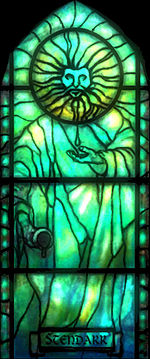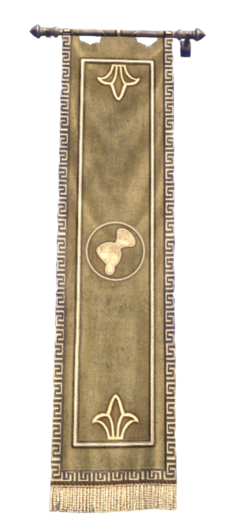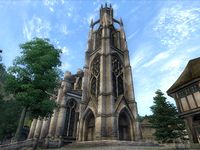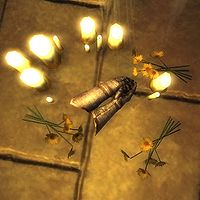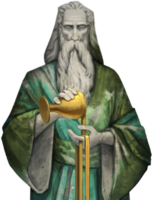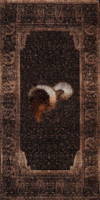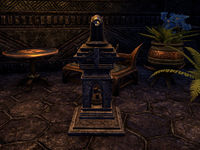Lore:Stendarr
—The Pocket Guide to the Empire, 3rd Edition
Stendarr, also known as Stendarr the Steadfast,[1] is the God of Mercy, Charity, Well-Earned Luck,[2] and Justice.[3] He is also acclaimed as the God of Compassion,[4][5] and Righteous Rule by Might and Merciful Forbearance.[6] Stendarr is the Apologist of Men,[7] patron of the Imperial Legion,[8] magistrates, rulers, and knights errant,[9] and one of the Divines.[10]
Contents
Origins and worship[edit]
Stendarr was originally worshipped as Stuhn, God of Ransom, shield-thane of Shor, but later developed into the current form of worship as a deity of compassion or, sometimes, righteous rule.[7] He is worshipped throughout Tamriel and is considered part of the Imperial, Breton, Altmer, Bosmer and Khajiit pantheons.[11][7]
Worship in Cyrodiil[edit]
The Imperials of the province of Cyrodiil venerate Stendarr and the Divine is considered part of the Cyrodiilic pantheon.[7] A Chapel of Stendarr is known to have been located in the city of Chorrol in the Second and Third Eras.[12][13] In the late Third Era, wayshrines dedicated to the Divine can be found throughout the countryside of the province.[13] A statue of Stendarr was featured in the Arboretum district of the Imperial City, the capital of Cyrodiil, in the Second and Third Eras.[12][13]
Although Ayleids followed the Daedra, the Aedra of Elven pantheon were still widely revered, with probably a majority of the Ayleids continuing to pay them homage, but cults devoted to the various Daedric Princes sprang up across Cyrodiil, tolerated and then celebrated.[14]
Worship in Elsweyr[edit]
Stendarr is worshipped as S'rendarr, the Runt, among the Khajiit of Elsweyr and is regarded as the son of Ahnurr and Fadomai.[15] According to the Khajiit, Ahnurr and Fadomai acclaimed S'rendarr as God of Mercy as he was the weakest child.[15] As God of Mercy, the Khajiit associate S'rendarr with compassion, charity and justice.[16] A Shrine of the Consummate S'rendarr was located in Jodewood in the Second Era until its priests were exiled for refusing to acknowledge the edicts proclaimed after the adoption of the Riddle'Thar Epiphany, causing the temple to fall into ruin and become occupied by bandits.[12]
Worship in Morrowind[edit]
The majority of the population of Morrowind do not venerate Stendarr,[17] however, in the late Third Era, worship of Stendarr and the Divines was practised by a small minority of Dunmer on the Island of Vvardenfell.[18] Worship of the Divine in Vvardenfell in the late Third Era was largely confined to its non-Dunmer population who could pray at shrines operated by the Imperial Cult, a missionary group, which combined worship of the Divines and provided services for all the Divines at shrines found at Imperial forts.[18] A shrine to Stendarr and the Divines was also located in the Royal Palace of Mournhold during this time.[19] Members of the Imperial Cult were said to "serve Stendarr" by taking on roles of protection.[8] Iulus Truptor, a member of the Imperial Cult, was called the "Stendarr Savant".[8] Another cult member claimed to have received visions from Stendarr guiding her to lost treasures.[8]
Following the collapse of the Tribunal Temple in 3E 427, worshippers of Stendarr and the Divines formed the majority of Hlaalu and Vvardenfell districts.[20] In the Second Era, during the Alliance War, a shrine to Stendarr, in the name of Stuhn, was located at the city of Mournhold.[12]
Worship in Skyrim[edit]
The ancient Nords worshipped Stundarr in the role of Stuhn associated with the totem of the whale. Stuhn was considered the God of Ransom and Justice, who taught the Nords the benefits of taking hostages. Stuhn was said to be brother of Tsun and both were shield-thanes of Shor who defended him against foriegn gods, who would fell Tsun. When Alessia overthrew the Aylied Empire she combined the Nordic and Elven Pantheons creating a new Pantheon of the Eight Divines. Though it was controversial in some parts of Skyrim, most Nords identify with Stendarr over Stuhn, whereas by contrast many still refer to Kynerath as her aspect of Kyne.[citation needed]
In the Fourth Era, shrines to Stendarr could be found throughout the province of Skyrim, in the wilderness and in urban centers, such as at the Temple of the Divines in Solitude.[21] The Vigil of Stendarr, a holy order founded after the Oblivion Crisis in 3E 433, had a chapter-house in Skyrim in the Fourth Era which was located south of the city of Dawnstar.[21] The Vigilants of Stendarr followed the teachings of Stendarr, provided healing services to the population of Skyrim, and engaged in combat with Abominations.[21] The chapter-house was destroyed in 4E 201 and its occupants, including the Keeper of the Vigil and head of the chapter in Skyrim, were killed by the Volkihar, the predominant vampire clan in the province.[22] The holy order also utilized a watchtower known as Stendarr's Beacon during this time.[21] A shrine dedicated to Stendarr and the Divines was located at Fort Frostmoth on the Island of Solstheim in the late Third Era.[23]
After imperialization and the loss of independence, some Reachmen embraced the worship of the Eight Divines, including Stendarr, believing that certain aspects of their traditional practices were best left in the past.[24][25][26]
Worship in the Iliac Bay[edit]
Stendarr is the patron deity of several regions in the Iliac Bay, including Alik'r, Bhoriane, Mournoth, Phrygias, Santaki and Urvaius, and is venerated by Redguards and Bretons alike.[27][28] Temples dedicated to the Divine could be found throughout the Iliac Bay during the late Third Era and were administered by the Temple of Stendarr, a religious organization dedicated to Stendarr and his teachings, which offered healing and training to the population of the Iliac Bay.[29] Only healers of the temples of Stendarr offered their services to both worshippers and heretics.[30] The Temple of Stendarr was led by a patriarch and was allied to the Benevolence of Mara, a religious organization dedicated to Mara and her teachings.[29] The Crusaders, also known as the Knights of Stendarr, was a knightly order dedicated to Stendarr which protected his temples against its adversaries, such as the Citadel of Ebonarm.[31] Stendarr is considered the most popular Divine among Redguard knights.[32]
Worship in the Summerset Isles[edit]
The Sect of Harmonious Masters of Lillandril was a sect dedicated to the teachings of Stendarr that emerged during the Second Era in the city of Lillandril.[33] The sect abhorred violence, offered healing and promulgated knowledge of healing spells to the general population.[34] The veneration of Stendarr is frowned upon by a minority of Elves who consider the god unworthy of the worship of the Children of Aldmeris because of his role as the Apologist of Men.[34] Aritanwe of Lillandril, a notable member of the sect, refuted criticism of the veneration of Stendarr among Elves in Rituals of the Harmonious Masters.[34]
Mythology[edit]
According to the creation myth presented in the Anuad, Stendarr and the aedra (gods) were born from the mingled blood of Anu and Padomay, the good and evil primal forces, respectively, and therefore have a capacity for both good and evil, in contrast to the daedra, who were born from the blood of Padomay, and thus are only evil.[35] The formation of Akatosh, the Dragon God of Time, from the mingled blood of the brothers Anu and Padomay facilitated the formation of Stendarr and the gods as they learnt to structure themselves.[36] Shezarr's Song, a Cyrodiilic creation myth, acclaims the creation of Mundus to the sacrifice of Stendarr and the gods whose sacrifices were embodied as eponymous planets.[37][38] Stendarr and the gods were subsequently bound to the Earth Bones as a result.[37] It is said that the Divine accompanied Emperor Tiber Septim in his later years in the early Third Era.[7] The Warp in the West, also known as the Miracle of Peace, in 3E 417 is attributed to Stendarr, Mara and Akatosh.[39]
Teachings[edit]
- "Those who don't believe in mercy must believe in fear." –Corbyn Rangouze, Priest of Stendarr[40]
Stendarr, through his priests, resolutes, and templars, makes his will known to the mortals of Tamriel,[41] and commands them to "be kind and generous to the people of Tamriel. Protect the weak, heal the sick, and give to the needy".[42] Stendarr offers mercy to all mortals and he welcomes heretics, the afflicted, the hopeless and the forgotten.[43] The Divine cherishes and protects all mortals regardless of whether they acknowledge him or not and he does not distinguish between worshippers and heretics.[17] The priests of Stendarr act as a conduit and he provides guidance and assistance to mortals through them.[43] Mortals who open their heart and soul to Stendarr's mercy and seek his benevolence are healed and gain understanding of the love Stendarr holds for all mortals, particularly those less fortunate.[34][43] He also offers help in the form of healing as Stendarr can mend any wound, stay any disease, and soothe any broken soul.[43]
Stendarr bestowed upon mortals the gift of magic and the ability to employ it,[34] with which mortals can seek Stendarr's wisdom through the use of restoration magic in his name.[43] Invocation of Stendarr grants the wielder the ability to cloak themselves in a righteous aura of blessed light, which has been adapted by the priests and resolutes of Stendarr to form either, a piercing beam resembling a spear, a form of armor or shield, or for use as a tool for healing.[33] However, the mercy of Stendarr does not extend to the enemies of mortals, who are referred to as Abominations, and the Divine considers them abhorrent and unnatural, and deserving of extermination without mercy.[41] Vinicius Imbrex, Archbishop of Chorrol, defined four kinds of Abominations - daedra, lycanthropes, the undead and vampires - in The Four Abominations.[41] Stendarr is known as the Divine who "suffers Men to read".[44]
Precepts of Stendarr[edit]
Stendarr commands all mortals to make themselves vulnerable to his will and follow his precepts:
- Never refuse aid you are capable of providing.
- Go among the infirm and the wounded wherever you find them.
- Offer prayer to Stendarr every day.
- Do not hoard wealth or indulge physically.[43]
Artifacts[edit]
Gauntlets of the Crusader[edit]
The Gauntlets of the Crusader, one of the Crusader's Relics, was created by Stendarr in the early First Era and granted to Pelinal Whitestrake, the Divine Crusader, to allow him to defeat and banish Umaril the Unfeathered, an Ayleid Sorcerer King. Pelinal, despite his victory over Umaril, was slain and the Crusader's Relics were scattered and lost for thousands of years.[45] The gauntlets were later recovered by Sir Casimir, a Knight of the Nine, in the early Third Era and remained in his possession until 3E 139.[45] The murder of a beggar at the hands of Sir Casimir in the Chapel of Stendarr in Chorrol in 3E 139 led Stendarr to deem Sir Casimir unworthy of his artifact and the gauntlets fell to the floor where they lay until coming into the possession of the Hero of Kvatch in 3E 433.[46]
Stendarr's Hammer[edit]
Stendarr's Hammer is a hammer rumored to have once been wielded by Stendarr, the God of Justice. One of his other titles, the God of Righteous Might, is fitting as the hammer is very heavy. It is made of ebony and sapphire, which can also be used to further temper it The weapon is enchanted to drain or damage the health of those it strikes, at the cost of the wielder's stamina.
Ring of Stendarr's Mercy[edit]
The Ring of Stendarr's Mercy is a ring that was linked to the Amulet of Kings and Sancre Tor, the ring served as a key to a ward of Stendarr protecting the Amulet in 2E 582. It was used by the Vestige to retrieve the Amulet alongside Sai Sahan.[47]
Widowill[edit]
Widowill is a suit of armor imbued with Stendarran holy protections. It was created when a soldier's widow in an Imperial village decided to take her husband's arms against a necromancer group that had set up nearby and had started grave robbing and kidnapping people. Stendarr noticed the woman's selflessness and blessed the armor with protections that reduced the attacking necromancers to dust.[48]
Organizations[edit]
Planet[edit]
The planet Stendarr, sometimes called THENDR, is one of the Planets in the skies of Mundus, and according to the Warrior-Poet, Vivec, it is one of the eight worlds known to the Dwemer. Stendarr is Julianos' satellite and is orbiting around it. As with all astral bodies seen in the skies above Nirn and their corresponding deities, the planet Stendarr is believed to be the plane of the god Stendarr as well as the god himself, as seen from the mortal plane. It is said to actually be a different plane of existence in its own right, infinite in size and mass, with its appearance as a sphere being only a visual phenomenon caused by mortal mental stress.
Gallery[edit]
Notes[edit]
- The Little Moon God Jone (Secunda) is also known as Stendarr's Sorrow.[7]
- Followers of the Divines use many variants on a common threat: they offer Stendarr's mercy, for they themselves will not give any.[13][21]
- Stendarr lends his name to the beverage known as Stendarr's Vigilance Ginger Ale.[49]
- The word for "relating to Stendarr" is "Stendarran".[50]
See Also[edit]
Books[edit]
- The Sounding Horn — A short text on the god Stendarr
References[edit]
- ^ Sir Roderic's dialogue in Oblivion: Knights of the Nine
- ^ Daughter of the Niben — Sathyr Longleat
- ^ Torasa Aram's dialogue in Morrowind: Tribunal
- ^ Varieties of Faith: The High Elves — Brother Mikhael Karkuxor of the Imperial College
- ^ Varieties of Faith: The Wood Elves — Brother Mikhael Karkuxor of the Imperial College
- ^ Loading screen in Skyrim
- ^ a b c d e f Varieties of Faith... — Brother Mikhael Karkuxor of the Imperial College
- ^ a b c d Stendarr dialogue topic in Morrowind
- ^ Varieties of Faith: The Bretons — Brother Mikhael Karkuxor of the Imperial College
- ^ The Talos Mistake — Leonora Venatus
- ^ Pocket Guide to the Empire, 1st Edition: The Elsweyr Confederacy — Imperial Geographical Society, 2E 864
- ^ a b c d Events of ESO
- ^ a b c d Events of Oblivion
- ^ Daedra Worship: The Ayleids — Phrastus of Elinhir
- ^ a b Words of Clan Mother Ahnissi — Clan Mother Ahnissi
- ^ Varieties of Faith: The Khajiit — Brother Mikhael Karkuxor of the Imperial College
- ^ a b The Friend of All Mortals — the Resolute Templar of Ska'vyn
- ^ a b Events of Morrowind
- ^ Events of Morrowind: Tribunal
- ^ A Life of Uriel Septim VII — Rufus Hayn
- ^ a b c d e Events of Skyrim
- ^ Events of Skyrim: Dawnguard
- ^ Events of Morrowind: Bloodmoon
- ^ Belchimac's dialogue in Skyrim
- ^ Cedran's dialogue in Skyrim
- ^ Degaine's dialogue in Skyrim
- ^ Patron deities of Phrygias, Santaki, Urvaius, Alik'r, Bhoriane and Mournoth in Daggerfall
- ^ Events of Daggerfall
- ^ a b Faction information for the Temple of Stendarr in Daggerfall
- ^ The Healer's Tale — Anonymous
- ^ Faction information for the Crusaders in Daggerfall
- ^ Varieties of Faith, The Forebears — Brother Mikhael Karkuxor of the Imperial College
- ^ a b Aura of the Righteous — Ptolus the Bright, Resolute of Stendarr
- ^ a b c d e Rituals of the Harmonious Masters — Aritanwe of Lillandril
- ^ The Annotated Anuad
- ^ The Monomyth
- ^ a b Aedra and Daedra
- ^ The Orrery in Oblivion: Orrery official download
- ^ The Warp in the West — Ulvius Tero
- ^ Corbyn Rangouze's dialogue in ESO
- ^ a b c The Four Abominations — Vinicius Imbrex, Archbishop of Chorrol, 1E 1051—1087
- ^ Ten Commands: Nine Divines
- ^ a b c d e f Precepts of Stendarr — Ptolus the Bright, Resolute of Stendarr
- ^ Pocket Guide to the Empire, 1st Edition: Invocation — Imperial Geographical Society, 2E 864
- ^ a b The Knights of the Nine — Karoline of Solitude
- ^ Events of Oblivion: Knights of the Nine
- ^ Valley of Blades quest in ESO
- ^ Armor of Myth and Legend — Aurelienne Dulroi
- ^ Stendarr's Vigilance Ginger Ale beverage in ESO
- ^ Stendarran Belt in Morrowind
|
|||||||||||||||||
|
|||||||||||
|
||||||||||||||||||||||||||
|
|||||||||||
|
|||||||||||||||||||||||
|
||||||||||||||||||||||||||||||||
|
||||||||||||||||||||||||||||||
|
||||||||||||||||||||||||||||||||||||
|
|||||||||||||||||||||||
